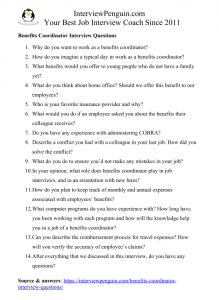The older we get, the more we think about retirement. Will we have enough money once our working life ends? And will we be able to cover our medical expenses? Can our employer help us in the process? People definitely care about benefits. Insurance, pension funds, or just a nice weekly visit to a spa center or to a massage parlor, on an expense of our employer. Who would not enjoy such minor luxury?
In order to stay competitive in the employment market, and to attract the best people, each company has to run an employees’ benefits program. Which means that they have to employ at least one Benefits Coordinator, sometimes also called Benefits Specialist. Let’s have a look at some questions you may face while interviewing for this interesting occupation.
Table of Contents
Why do you want to work as a benefits coordinator?
Because you’ve been working in HR before, you had a taste of different areas of human resources (recruitment, employee training, payroll, etc), and found administering employees’ benefits programs the most interesting one–at least for you.
You’d like to specialize in this field, because you understand the importance it has. You see the competitive advantage a company can gain with an interesting benefits program that’s properly communicated to both job applicants and existing employees.
What’s more, you have a decent knowledge of applicable laws and regulations, and excellent verbal and written communication skills. It makes from you a great candidate for the job.
How do you imagine a typical day in work as a benefits coordinator?
You’ll be responsible for a lot of administrative work. Entering data to payroll systems, completing insurance and vacation forms, taking care of new hires and absentee reports, and so on. Do not forget to mention it in your answer. Administrative work is not the fascinating part of this job, but it forms the major part of it…
You will also help with new employee orientation, explaining the benefits their position entitles them to, and filling some forms and questionnaires with them. It’s hard to describe a typical day in this job, because you’ll respond for a variety of duties. Which one you’ll do on a given day depends on the needs of employees, and whether the company is hiring new staff at the moment.
Nonetheless, you can at least try to describe a typical day, without focusing on particular working duties. For example, you can say that you imagine arriving to work and having a short meeting within the HR team, checking the agenda for the day, any problems that has arisen lately, etc.
Then you will prepare a to-do list (may include some duties I already mentioned), and systematically work on it, taking care of the most important and most urgent things first.
The key is to show the hiring managers that you have some system in your work, that you can organize your day.
What benefits would you offer to young people who do not have a family yet?
A typical workplace is a mix of personalities and demographic groups. They may ask you about benefits for each group, this one is just an example.
Most young people are happy with a cell phone and a mobile plan covered by the company, and perhaps a company laptop or a car (of course this depends on the position, and whether they really need a car or a computer in their work). You can talk about season tickets to fitness center, or to a swimming pool, and of course health insurance–that is a concern of all demographic groups.
Try to be creative with your ideas. Life isn’t only about technology. Motivating young people to workout and spend time outside will benefit both them and their employer (becasue they will be healthier and won’t absent from work often).
What do you think about home office? Should we offer this benefit to our employees?
This is a tricky question. Long term studies suggest that people maintain the same efficiency and motivation while working from home for a first month or two, but things go pretty much downhill from there on…
On the other hand, the pandemic of covid-19 has forced many companies to introduce home office as a new standard. And home office is motivating, and company may attract some talented job seekers when offering this benefit.
Say that you will definitely consider it, but would suggest introducing an effective way of measuring efficiency of people working from home. Once you have results from an initial test group, you will know better whether or not it makes sense to offer home office benefit.
Alternatively you can say that a company which wants to stay competitive cannot afford not to offer home office at least once a week, and that it also your suggestion–to allow employees to work from the comfort of their home once or twice a week.
Special Tip: You can download the list of all questions in a one page long PDF, and practice your interview answers anytime later, even when offline:
Who is your favorite insurance provider and why?
The name of the company is not as important as your explanation. You should choose a provider that is good for both the employee and the employer.
That means, basically, one who can offer the best insurance packages to the employees at the lowest possible cost to your employer. Good insurance covers hospitalization, visits to a GP, outpatient treatments, drugs (not over the counter), preventive care such as vaccination, pediatric care, mental health and substance abuse care, or even rehabilitation.
Do your research, check some providers. I do not want to give names here, because the purpose of this article isn’t to promote some insurance companies :), and it is also meant for international audience. But if you can compare two or three major providers in your interview, your interviewers will surely be impressed with your knowledge and preparation for the interviews.
What would you do if an employee asked you about the benefits their colleague receives?
Say that you would politely refuse to answer their questions. Some employees are more important than others, some people try their best in work each day, and others don’t. It’s logical that not everyone gets the same benefits.
Ensure the interviewers that in order to prevent useless conflicts and gossips on the workplace, you will keep the data about employee benefits strictly confidential. What’s more, you suggest that all employees sign an NDA, and are obliged not to share the information about the benefits they receive with their colleagues.
Other questions you may face in your benefits coordinator job interview
- Do you have any experience with administering COBRA?
- What motivates you the most in this type of work?
- Describe a conflict you had with a colleague in your last job. How did you solve the conflict?
- What do you do to ensure accuracy in your job?
- In your opinion, what role does benefits coordinator play in job interviews, and in an orientation with new hires?
- How do you plan to keep track of monthly and annual expenses associated with employees’ benefits?
- What computer programs do you have experience with? How long have you been working with each program and how will the knowledge help you in a job of a benefits coordinator?
- Can you describe the reimbursement process for travel expenses? How will you verify the accuracy of employee’s claims?
- Tell us about a time when you were innovative at work.
- Describe a time when you struggled to communicate something to your boss, colleague, or to a customer. How did you manage to get your message over?
- Tell us about a time when you had to make a decision without having all information you needed.
Special tip: Not sure how to answer the behavioral questions, “tell us about a time when…”, “describe a situation…”, etc? Have a look at our Interview Success Package, where you’ll find up to 10 brilliant answers to more than 100 interview questions, including 30+ behavioral questions–basically everything a hiring manager can throw at you in your interview.
Final thoughts
Interview for a position of a Benefits Coordinator belongs to interviews with average difficulty. This is not a fancy job title and one needs previous experience in HR to apply. For this reason, you typically won’t compete with many other people for the job, what definitely makes your situation easier.
On the other hand, you may face some difficult situation questions (just like I described in the article), and some technical questions (related to labor laws, insurance plans, specialized software packages, HR terminology, and other areas). These questions are not easy even for people who have previous experience in human resources…
Do you research, try to learn as much as you can about the existing employees’ benefits programs your prospective employer offers. Then think about the duties and responsibilities you’ll have while coordinating these benefits. It should help you understand the questions you may get, and also the terminology and applicable laws you should check before the start of your interview. Last but not least, try to prepare at least a short answer to each question you may face, to make sure you avoid embarrassing silence in your interview. I hope you will succeed, and wish you best of luck!
Matthew
May also interest you:
- Billing Coordinator interview questions.
- Payroll Clerk interview questions.
- HR generalist interview questions – Some questions may overlap with the questions for billing specialist or coordinator. Check them out.


